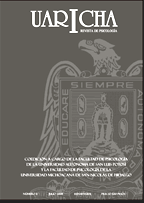Educators as enhancers of emotional development.
Main Article Content
Abstract
El desarrollo emocional es un aspecto que requiere analizarse en diferentes planos por todos los elementos que involucra, cuando hablamos de él con relación a lo educativo nos surgen una serie de interrogantes como los siguientes: ¿Qué es lo normal en un niño? ¿Cuándo podemos decir que alguien requiere de un apoyo especializado porque presenta alteraciones de tipo emocional? ¿Los problemas en el aprendizaje se relacionan con los problemas en lo afectivo? ¿Qué puede hacer el maestro en estos casos? etc.
Article Details
Section

This work is licensed under a Creative Commons Attribution-NonCommercial-NoDerivatives 4.0 International License.
The authors have the right to ownership or copyright and they give to "Uaricha Psychology Magazine" the right to publish for the first time the article, as well as disclose and distribute it on the technological available media and through repositories.
Uaricha Psychology Magazine, is a quarterly publication, published by the Psychology College of the "Universidad Michoacana de San Nicolás de Hidalgo", Street Francisco Villa No. 450, Col. Dr. Miguel Silva, Morelia, Michoacán, P. C. 58110. Phone (+52) 443 312 9909, ext. 149, www.revistauaricha.umich.mx, uaricha.publicaciones@umich.mx. Responsible publisher: Roberto Oropeza Tena. Reserve of exclusive use rights No. 04-2013-070413365500-203, e-ISSN: 2007-7343, Granted by the National Institute Copyright. Responsible of the last update of this number, Computer center of the Psychology College, Ing. Erick Vidar Alva Rangel.
How to Cite
References
Díaz Ortega, C. “El teatro escenario de las emociones” en : Un camino por el mundo de las emociones. Ediciones del Plumicornio. México 1992
Freud A. (1979) Normalidad y Patología en la niñez. Editorial Paidós, Barcelona, España.
Gojman de Millan S.; “Primeros sentimientos” en: Un camino por el mundo de las emociones. Ediciones del Plumicornio. México 1992.
A. Higgins; F. C. Power; Lawrence Kohlberg. (1997) La educación moral según Lawrence Kohlberg. Barcelona. Editorial Gedisa.
Putnam, S. P., Sanson, A., y Rothbart, M. K. (2002). Child temperament and parenting. In M. Bornstein (Ed.), Handbook of parenting. Mahwah, NJ: Erlbaum.
Rosete. O. M. G. “La escuela enajenante” en:Un camino por el mundo de las emociones. Ediciones del Plumicornio. México 1992.
Spinrad,T.L., Stifter C.A., Doneland-Mc Call, N. y Turner, L (2004). Mothers‟ Regulation Strategies in Response to Toddlers‟ Affect: Links to Later Emotion Self-Regulation. Social Development, 13,1, 40-55.
Stansbury, K. y Zimmermann, L. (1999).Relations Among Child Language Skills, Maternal Socialization of Emotion Regulation, and Child Behavior Problems.Child Psychiatry and Human Development, Vol. 30(2),121-142.
Winnicott, D. “Las necesidades del niño y el papel de la madre en las primeras etapas” en: El niño y el mundo externo. Buenos Aires, Argentina, 1980. Edit. Horme

